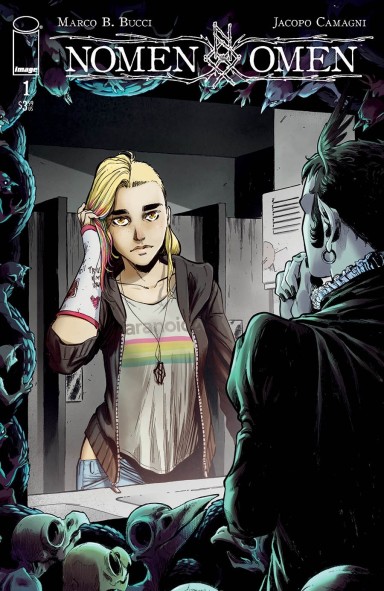Nomen Omen
Someday I'll find a comic to review that doesn't do the thing that makes me go RRRRRRRRRRRRRRRRRRRRRR
This one was so close, too.
Before I go in on this, I want to be clear that I really liked most of Nomen Omen's first issue. I did. It's legitimately good. The story kicks off with, you know, story. Nobody explains anything. The characters are off and running, and they just go until they run into the inciting incident of the rest of the issue (and the series, I suppose, for as long as it goes). Even when it gets weird—and if you didn't think a comic with the name Nomen Omen was going to get weird, I'm a little curious what you did expect—the creators let you sit with the weirdness and wonder what the hell is going on.
The first part of the comic takes place in the past. The next scene is "Today". However, to their credit, they don't just let "Today" hang there and make you figure out approximately when the story is going on. You get real contextual clues so you can determine when the story is actually happening. I'm a fan of that, too. You've got at least four characters who matter running around, you don't know anything more about them than you need, but you know enough to make them worth following.
Then the villain comes in and explains it all.
Now, if you've read it, or if you read it after this, you might very easily say, "I don't know if that's the villain." You'd be doing it, however, on the basis that it seems a little too obvious for that to be the actual villain of the story. This person is very much an antagonist and is very clearly being set up as the villain for now, regardless of whether or not the story hews to that idea forevermore.
If you've read my other (few) comic reviews, you'd also realize that's not the point. The villain (?) is just talking, talking, talking. Explaining through exposition is awful, despite the fact comics seem addicted to doing it, and it's even worse in this case because there's all this exposition and what's going on still isn't particularly well explained. If you're not going to get the point across, make the characters shut up and keep it weird.
This also leads into another crack in the writing. At one point, there's a "so-and-so has been in an accident" phone call. It's a familiar trope, so I don't necessarily fault someone for using it to move a story along. I do, however, fault a writer who uses it when what happened is pretty obviously not an accident in any way, shape, or form. Like I said, the story gets weird, so if I'm trying to figure out what a hospital staffer making that phone call is going to say, there isn't a clear answer. An incident? An attack? What it definitely is not, however, is an accident. But it's a trope, so it gets tossed in. Meh.
And all of this sucks so much because, again, the comic was rolling along quite well most of the way through. There was a piece of poetry that... look, I'm biased. I know some top-percentile poets, and I can't expect comic writers to be on that level. But after knowing those poets, this poetry made me think, maybe not with the poetry? It's not terrible, and I feel like I'm being too harsh picking this out for criticism. It was the only shaky bit before the villain came in, though, so I'm bringing it up.
Here's the thing—I feel like there must be some aspect of the comic business, of selling comic-style stories, that I don't understand. The blurb on Image's website says, in part, "Enter Becky Kumar, a geeky twenty-year-old from New York City who is about to cross the veil between our reality and a realm of otherworldly truths." Becky Kumar, by the end of this issue, should not be alive. You might assume she is just because killing her so fast would seem like very awkward storytelling, but if you look at exactly what happens to her... it's not possible. Yet, if you see the blurb, your expectations of what will come after this issue are entirely different. You know she must, so you'll read the comic in a totally different way.
I like Image. I know they care about telling interesting stories, and more often than not they do a good job of it. This may well become one of them. But how do you tell a story—a serial story, no less—with marketing that can change the entire reading of that story? Marketing that someone can easily miss? And how much of that marketing influenced the writing of the script, or at least where they chose to break between issues? Was my experience of reading this comic partially damaged because I didn't read the marketing until afterwards, and thus was unprepared for something which made no bloody sense at all?
One more time... I did like Nomen Omen. I'll read the second one and see if I can stick with it. I think most people who like weird, world-bending stories will be able to get into this, whether or not I can.
Score: The strangest 8/10.

No comments:
Post a Comment